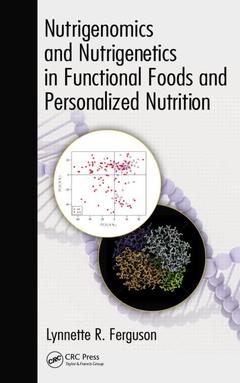Description
Nutrigenomics and Nutrigenetics in Functional Foods and Personalized Nutrition
Coordinator: Ferguson Lynnette R.
Language: English
Subjects for Nutrigenomics and Nutrigenetics in Functional Foods and...:
Keywords
Personalized Nutrition; Intestinal Microbiota; Nutrigenomics Research; commercialization of nutrigenetics; Functional Foods; commercialization of nutrigenomics; DTC Genetic Test; commercialisation of nutrigenetics; Nutritional Genomics; commercialisation of nutrigenomics; Fatty Acid; industry–academia partnerships; Gene Diet Interactions; private–public partnerships; Celiac Disease; genetic testing; DNA Methylation; Minor Allele Homozygotes; gene–diet interaction; Genome Wide Association Studies; modifying disease risk through nutrigenetics and nutrigenomics; Bioactive Food Components; technologies in nutrigenetics; Gene Nutrient Interactions; technologies in nutrigenomics; Nonalcoholic Fatty Liver Disease; bringing nutrigenomics to industry; health professionals and the public; Intestinal Inammation; GG Homozygote; IBD; Dietetics Practitioner; FTO Rs9939609; T2 Dm Risk; DTC Testing; Gut MICROBIOTA; Metabolomic Analysis; Omega-3 Fatty Acid
452 p. · 15.6x23.4 cm · Hardback
Description
/li>Contents
/li>Readership
/li>Biography
/li>
While functional foods have become a reasonably well-established concept, personalized nutrition is still treated with skepticism by many. The recognition that people would have different nutrient requirements, or perceive foods in different ways, raises several concerns?some real, some not so real. Nutrigenomics and Nutrigenetics in Functional Foods and Personalized Nutrition addresses what is needed to bring nutrigenomics, nutrigenetics, and their associated technologies to market in a truly impactful way.
Edited by Lynnette R. Ferguson, a well-known and internationally respected researcher, the book covers a wide range of issues, from the purely scientific to ethical, consumer-driven, and public health aspects. It takes a close look at gene?diet interactions and explores the ways in which studies on nutrigenomics and nutrigenetics can help modulate disease risk in cardiovascular disease, obesity, diabetes, and inflammatory bowel disease. Topics include regulatory challenges, genetic testing for consumers, data mining, transcriptomic analysis, and the role of science and health professionals in the commercialization of nutrigenomics and nutrigenetics. The book also examines industry?academia partnerships as a nexus between the science and its commercialization by the food industry. These partnerships will be an important determinant of what value the technologies bring, not only to the market but to the wider health and well-being of society.
Exploring how nutrigenomics and nutrigenetics can help modulate disease risk, this timely book brings together stimulating, well-thought-out perspectives from established and emerging researchers. It provides valuable information on a subject that is becoming increasingly important for nutritionists, dieticians, and clinical professionals, as well as for the food industry and research community.
Examples of Some Key Gene-Diet Interactions: Nutrigenetics and Nutrigenomics: Importance for Functional Foods and Personalized Nutrition. Variations in Solute Transporter Genes Affecting Micronutrient Solute Transport and Human Health. Genetic Variants in the Omega-6 and Omega-3 Fatty Acid Metabolic Pathway: Their Role in the Determination of Nutritional Requirements and Chronic Disease Risk. Nutrigenomic Approaches to Unraveling the Physiological Effects of Complex Foods. Modifying Disease Risk through Nutrigenetics and Nutrigenomics: Modulating the Risk of Cardiovascular Disease through Nutrigenetics. Modulating the Risk of Obesity and Diabetes through Nutrigenetics. Nutrigenetics and Crohn’s Disease. Microbiome and Host Interactions in Inflammatory Bowel Diseases: Relevance for Personalized Nutrition. Importance of Cell-Specific Gene Expression Patterns for Understanding Nutrient and Gene Interactions in Inflammatory Bowel Diseases. Technologies in Nutrigenetics/Nutrigenomics: Data Mining and Network Analysis: Potential Importance in Nutrigenomics Research. Metabolomics: An Important Tool for Assessing State of Health and Risk of Disease in Nutrigenomics Research. Epigenetics—What Role Could This Play in Functional Foods and Personalised Nutrition? Foodomics to Study Efficacy of Human Dietary Interventions: Proof of Principle Study. Considerations in Estimating Genotype in Nutrigenetic Studies. Bringing Nutrigenomics to Industry, Health Professionals, and the Public: Bringing Nutrigenomics to the Food Industry: Industry–Academia Partnerships as an Important Challenge. Commercialization and Potential of Nutrigenetics and Nutrigenomics. Bringing Nutrigenomics to the Public: Is Direct-to-Consumer Testing the Future of Nutritional Genomics?. Nutritional Genomics in Practice: Interaction with Health Professionals in Bringing Nutritional Genomics to the Public. Harvesting Normative Potential for Nutrigenomic Research. Public Health Context for Nutrigenomics and Personalized Nutrition. Nutrigenomics and Public Health. Index.
Lynnette R. Ferguson, D.Phil., D.Sc., QSO, FNZIFST, works at the Auckland Cancer Society Research Centre, using mutagenicity testing as a predictor of carcinogenesis. In 2000, she also took on a 50 percent role as head of the Nutrition Department at the University of Auckland. Her research interests include the interplay between genes and diet in the development of chronic disease, with particular focus on inflammatory bowel disease, a cancer-prone condition, and also in prostate cancer. As program leader for the multidisciplinary-multiorganization Nutrigenomics New Zealand, she is working to bring nutrigenomics tools and potential to the New Zealand science scene. She is the author or coauthor of more than 300 peer-reviewed publications, including chapters in books and articles in international journals. She serves as one of the managing editors for Mutation Research: Fundamental and Molecular Mechanisms of Mutation and is on the editorial boards of several other major journals.




